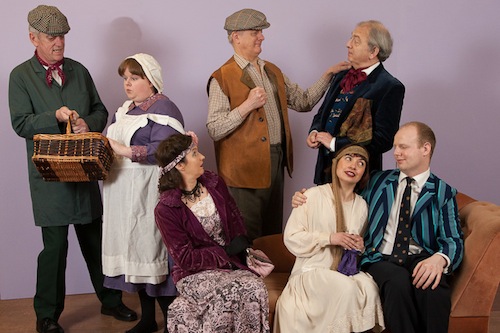Heading For A Wedding – Review
✭✭✭✩✩ Laughs on the bridal path
Church Hill Theatre
Wed 19 – Sat 22 March 2014
Review by Hugh Simpson
There’s a great deal of fun to be had in Edinburgh People’s Theatre’s world premiere of Heading For A Wedding, an omnibus of adaptations of Moliere.
Writer JJ Mills has crafted new versions of four of Moliere’s shorter works, all dealing with the pursuit of women by men (and vice versa), with the requisite number of self-deluding older men pursuing younger women, young lovers who find obstacles in the way of their happiness, and resourceful servants.
The titles Mills has given the constituent parts, such as Withering Sights and Doctor’s Farrago, indicate
one of the evening’s most essential ingredients – a series of puns both clever and groan-inducing. Added to this there are some almost music-hall elements, including some filthy double entendres, which bring it close to panto.
Since some of the original pieces had their roots in commedia dell’arte, often stated to be the forerunner of the pantomime, this is entirely appropriate. There are also some accomplished and experienced panto performers on stage who manage to get the most out of the material.
There is little doubt that much of it is very funny indeed, and the evening could be said to be extremely successful in that regard. Any of the pieces – particularly The Mate’s Tricks – would be fantastic as part of a more varied evening. However, the similarity in plot between the four pieces leads to a distinct lack of variety.
The music hall roots of some of the routines highlight this homogeneity even more clearly. When a spot of dance is thrown in at the end, seemingly as an afterthought, it only shows how some form of musical interlude might have been useful earlier – particularly in Men’s Insensibility, the second piece, which is by far the longest and suffers the most from a lack of pace despite the best efforts of the cast.
The constant use of the same devices in the dialogue means that what starts as fresh and funny becomes a little predictable. The numerous malapropisms are all effective in themselves but become less so over time. The shoehorning of song titles and lyrics into the script also suffers from repetition; being told somewhere is located ‘past the Duchy, on the left-hand side’ is tremendous, but umpteen other examples begin to pall.
Most of the cast appear twice, and the standard of performance is extremely high. The aforementioned Mate’s Tricks is dominated by Graham Bell as the Mr Toad-ish, self-deluding Alceste, whose rapport with the audience is first class, a skill also displayed earlier by Iain Fraser, whose hangdog expression when dressed up in Tweedledee-style armour is priceless.
“sharp and slick”
Kirsty Boyle shines in two contrasting roles, with her sulky maid Charlotte being a good example of how effective you can be when saying very little. This is also understood by Sally-Ann Coxon in both her roles, and most particularly by Joan Hunter, whose reaction to the supposed slight of being given only one small role got the evening’s biggest laugh.
Kyle Sutherland’s relish of the ripest innuendo is beautifully judged, while Lynn Cameron’s Countess de Balivernes, oblivious to her own vulgarity, is a very funny performance. Anne Mackenzie’s channelling of Mrs Thatcher in the role of a local councillor is also a far more tasteful and nuanced display than it might have been. Gordon Braidwood, Carole Renfrew, Mike Keenan and Tom Mulhall also manage to bring out the humour in their various roles without sacrificing believability.
Mandy Black manages to bring a surprising dignity as well as levity to the role of Marianne in Men’s Insensibility, while Scott Braidwood copes very well with the physicality required in the role of Jouvet in Doctor’s Farrago, especially when called upon to strangle himself.
Doctor’s Farrago could be a little more effective if treated as more of a breakneck farce, but the rest of the evening is beautifully paced by director John Somerville; any longueurs are down to the unavoidably repetitive nature of the material. The set design is simple but striking, with the changeovers between the two parts of each act being an object lesson in how it should be done.
Robert Fuller’s lighting is equally competent, and the whole evening is pretty sharp and slick. Shaving a little time off each playlet (and a lot of time in one case), allied to some variety in the humour and the addition of the odd speciality act, would have made a really top-class entertainment. As it is, it is somewhat patchy but distinctly entertaining.
Running time 2 hrs 30 mins including interval
Run ends Saturday 22 March 2014
Evenings Wed – Fri 7.30 pm, Matinee Sat 2.30 pm
Church Hill Theatre, 33a Morningside Road, EH10 4DR
Full details from http://www.ept.org.uk/
ENDS


















